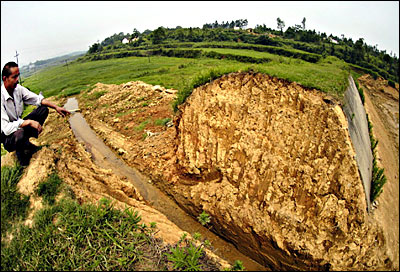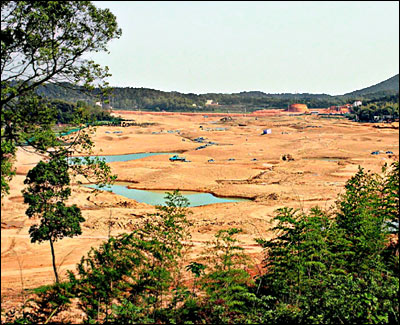| Home / Government / Focus News | Tools: Save | Print | E-mail | Most Read |
| Ministry Vows to Curb Loss of Farmland |
| Adjust font size: |
China's minister of land and resources said on Friday his department would strengthen land management to prevent the loss of more arable land. The illegal occupation and use of land is widespread in the country and is often backed by local governments, he said. Ministry statistics suggest 34 per cent of construction projects over recent years have used land that had been taken illegally. China faces the extremely difficult task of retaining 120 million hectares of arable land by 2010, a goal laid down in the 11th Five-Year Plan (2006-10), said minister Sun Wensheng at a conference to mark the 20th anniversary of the Law of Land Administration. Sun said his ministry was building a monitoring system to supervise land use across the country. "We should strictly implement the Law of Land Administration and severely punish those engaged in illegal land use," Sun said. Figures suggest that from October 2004 to May 2005, 50 per cent of land used for construction had been illegally acquired, according to a ministry survey. Such practices include: Using agricultural land for non-agricultural projects without the land authorities' approval. Under-the-table transactions between local governments and land developers. Building development zones, villas and golf courses in the name of attracting investment. Sheng Huaren, vice-chairman of the National People's Congress, said the task of protecting China's limited arable land was urgent. Per capita arable land in China is 0.093 hectares, only one third of the world average. As China's population is estimated to peak at 1.5 billion in the 2030s, that figure will drop further. China's arable land has been reduced from 130 million hectares in 1996 to 122 million hectares last year. "It would be negligent if the government failed to safeguard the bottom line of 120 million hectares of arable land by 2010," Sheng said. The National People's Congress sent out work teams to inspect the implementation of the Law of Land Administration in 2004. These teams found a number of problems, many of which have received attention from the government. Since the inspection, 4,435 illegal development zones have had their status cancelled and a total of 14.5 billion yuan (US$1.79 billion) has been paid to compensate farmers whose land had been seized for non-agricultural use. But because illegal land use continues, the ministry issued a notice last month instructing the authorities to tighten control over land use and curb excessive investment in fixed assets. China Business News quoted a former director of the Ministry of Land and Resources as saying that the ministry is planning to establish a land inspection system. It will divide the country into eight regions, each with a land inspector dispatched by the ministry. The land inspector will be authorized to oversee local governments' land policies and practices.
(China Daily June 24, 2006) |
| Tools: Save | Print | E-mail | Most Read |
 |
| Related Stories |
|

